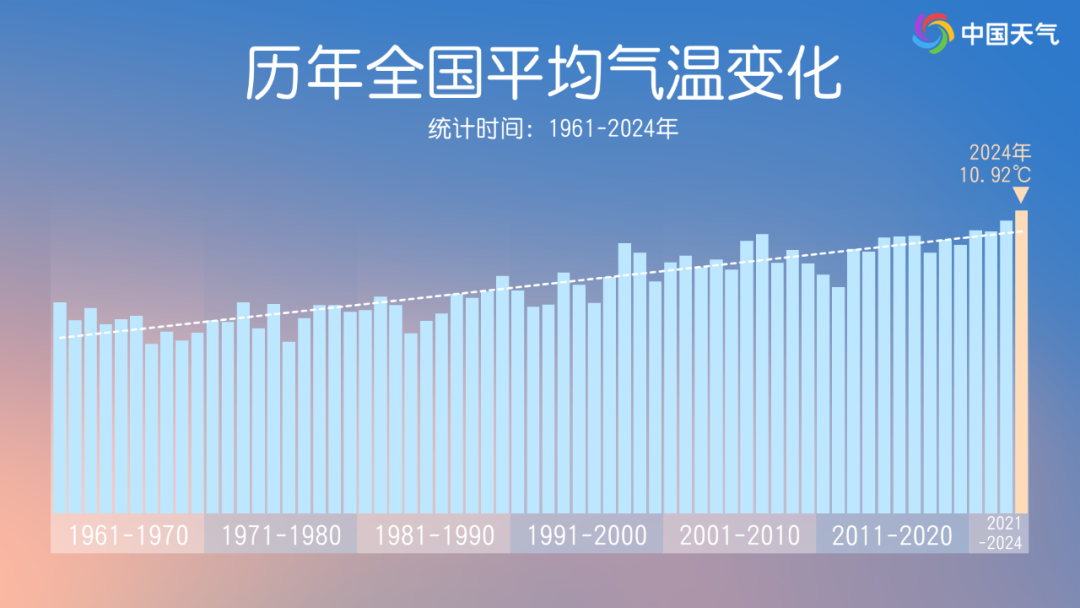Global warming led to above-average temperatures in nation, say experts

Global warming is the primary reason for China recording above-average temperatures, a meteorological expert said, as data showed that 2024 was the warmest year since 1961, when the country began compiling complete meteorological observation records.
The nation's average temperature reached 10.92 C last year, 1.03 C higher than the historical average, making it the warmest year on record, according to the China Meteorological Administration.
Data from Weather China, the public weather service center of the CMA, shows that the average temperatures recorded across all provincial-level regions on the Chinese mainland last year ranked among the highest temperatures recorded during the top four warmest years in the country's observation history.
The past four years were actually China's top four warmest years, while the country's top 10 warmest years have all been recorded in the 21st century, according to Weather China.
"Global warming has led to phenomena such as rising sea levels and glacier melt, which continue to impact China. For instance, it has significantly increased the frequency and intensity of extreme weather events, resulting in more frequent and prolonged heat waves while reducing the occurrence of cold events," said Shi Ying, a researcher at the National Climate Center.
Natural climate variability such as the El Nino phenomenon — the unusual warming of water surface temperatures in the Pacific Ocean — has also played a role in rising temperatures.
"During the decaying phase of an El Nino event, typically the following year, global average temperatures tend to rise, potentially increasing the frequency and intensity of extreme climate events and magnifying global warming," Shi said.
The El Nino event, which began in May 2023, has continued to influence China, contributing to its above-average temperatures last year, she added.
On Dec 30, the World Meteorological Organization also announced that 2024 is set to be the warmest year on record, capping a decade of unprecedented heat fueled by human activities.
In his recent New Year's message, United Nations Secretary-General Antonio Guterres said the world has "endured a decade of deadly heat", with 2024 capping 10 years of unprecedented temperatures.
WMO Secretary-General Celeste Saulo described the year 2024 as a sobering wake-up call. "Every fraction of a degree of warming matters, and increases climate extremes, impacts and risks," she said.
Yu Li, another researcher at the National Climate Center, warned that a 1 C increase in the average temperature could lead to significant and widespread effects on ecosystems. This 1 C increase is associated with an approximately 2.3-meter rise in sea level over time, threatening coastal ecosystems, she noted.
"Rising temperatures affect the genetic diversity of wild crop species and increase the prevalence of pests. Some species may face extinction due to their inability to adapt to rapid climate changes," Yu said.
A study shows that a 1.58 C rise in the average global surface temperature could lead to the extinction of over 10 percent of species, she added.
Qin Yun, a senior engineer at the National Climate Center, emphasized the impact of rising temperatures on human activities such as agricultural production.
"Some regions may see temporary increase in crop yields due to warmer temperatures. However, in the long term, agricultural production will likely face greater fluctuations and potential declines," Qin said.
Uneven precipitation patterns caused by global warming could lead to decreased rainfall in some areas, resulting in water shortages. "It's estimated that a 1 C rise could increase the number of people affected by water scarcity by 400 million to 1.7 billion," Qin said.
Rising temperatures also elevate the risks of heat-related illnesses such as heatstroke and heat exhaustion, contributing to higher mortality rates, she added.
The year 2025 has also begun with warmer-than-average temperatures. On Wednesday afternoon, much of the area south of the Yangtze River experienced temperatures exceeding 15 C, which is far from the biting cold typically expected during winter.
A cold front for the whole country was forecast from Jan 2, but due to its weak intensity, most areas will experience above-average temperatures despite some mild fluctuations until Jan 12, the National Climate Center said.
Researcher Shi said that extreme heat events in China are projected to increase in frequency, with longer duration and broader impact.
"Under high emission scenarios, an extreme heat event that currently occurs once in 50 years could occur every one or two years by the end of the 21st century," Shi said.
She suggested developing early-warning systems for climate risks, focusing on the spatial-temporal patterns of extreme events such as heat waves. "We need to conduct detailed assessments of the impacts of extreme weather events on key sectors."
Measures should also be taken to develop monitoring and risk-warning technologies, as well as for enhancing societal resilience to climate change, she added.
